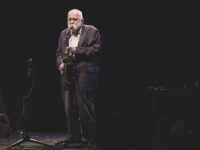Whenever Peter Brötzmann brings his reeds, he brings the wood, too. That’s the case today just as much as it was the case during his career-defining Machine Gun days.
Every concert he performs is a brash, guttural statement of raw, blood curdling emotion, which is why so many of them are made into albums and why he remains productive and still wearing the crown of free jazz saxophone relinquished by Albert Ayler when he drowned in the East River in late 1970.
Earlier that year, Brötzmann assembled a large band for a show in his home country of West Germany. This consisted of drums, organ, electric guitar, three saxes and four trombones, and one could only imagine what kind of music was being made with that kind of wack setup. But since it was being led by Brötzmann, it could only mean they were playing Peter Brötzmann brand noise-jazz. The song is titled “Fuck de Boere,” but the sounds behind the name are often much more uncivil than that.
With that many horns blasting away without any coordination, it begins making the noise of a testy, tense traffic jam. After five minutes of fooling around like that, it blows up and settles back into the prattle amongst the trombones, occasionally punctuated by saxophone eruptions. This happens a lot over the course of the song; a typical Brötz tune flows generically among tension, tension release and some uncertain status in-between.
The commotion withers into near-total silence around the twelve minute mark, but distant primal screaming soon emerges and an uneasy feeling that things are about to explode again. And it’s Han Bennink who cuts loose first, on his trap kit. Bennink was never a thumper so much as a basher and sometimes merciless thrasher, one of the rare drummers in out-jazz who has such a mastery of nuanced timbres and tones. Later, when another spacious moment following a climatic seven-horn blast gives Derek Bailey a chance to come out from under the commotion and create some of his own, Bennink is there matching the British guitarist’s percussive skitterings with idiosyncratic percussive skitterings of his own. It’s probably the most synergistic moment of the whole song.
Brötzmann soon leads his legion of brass to break it up — the ban on standing in place is strictly enforced — and Fred Van Hove’s organ can finally be heard after that wave subsides, but barely so, as he gets submerged at nearly every turn. About thirty minutes in, the various horns begin to coalesce, first like a tornado, and then this simple, repeating figure emerges; any sign of conventional music appearing in a Brötzmann tune is always the weirdest moment of the song. After the complete septet of horns race toward a conclusion that crashes repeatedly, another “normal” horn phrase brings the thirty-six minute train wreck onto its unexpected end.
This recording from a Frankfurt concert sat around untouched for over three decades until finally packaged into an album with a pre-studio 1968 performance of “Machine Gun”, and released in 2001. Maybe they felt the public wasn’t ready for music this radical.
Now more than forty years later, I’m not sure if the public could ever get ready enough for this.
[amazon_enhanced asin=”B00005B7HK” /] [amazon_enhanced asin=”B00000JONY” /] [amazon_enhanced asin=”B00000JONZ” /] [amazon_enhanced asin=”B0065QG9SA” /] [amazon_enhanced asin=”B008A0IKLI” /]
- James Brandon Lewis Quartet – ‘Abstraction Is Deliverance’ (2025) - May 27, 2025
- Soft Machine – ‘Drop’ (1971, 2025 remaster) - May 21, 2025
- Marshall Allen’s Ghost Horizons – ‘Live In Philadelphia’ (2025) - May 19, 2025



